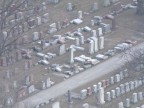Fonte:
The Wall Street Journal
Autore:
Rebecca Ballhaus, Beth Reinhard
Addressing Anti-Semitism
“The anti-Semitic threats targeting our Jewish community…are horrible.”
President Donald Trump denounced anti-Semitism on Tuesday, following mounting calls for him to address a rash of bomb threats against Jewish community centers and the vandalism of hundreds of Jewish graves at a Missouri cemetery. “The anti-Semitic threats targeting our Jewish community at community centers are horrible and are painful and a very sad reminder of the work that still must be done to root out hate and prejudice and evil,” Mr. Trump said at a speech at the National Museum of African American History e Culture, which he visited Tuesday. Mr. Trump, a Republican, said the tour of the museum “was a meaningful reminder of why we have to fight bigotry, intolerance and hatred in all of its very ugly forms.” Phoned-in bomb threats were reported at 11 Jewish community centers on Monday, the fourth in a wave of such threats this year, according to the Jewish Community Center Association of North America. The other threats occurred on Jan. 9, 18 and 31, bringing the total number to 69 at 54 centers in 27 states and one Canadian province. All turned out to be hoaxes. “While we are relieved that all such threats have proven to be hoaxes and that not a single person was harmed, we are concerned about the anti-Semitism behind these threats and the repetition of threats intended to interfere with day-to-day life,” said David Posner, director of strategic performance at JCC Association of North America. The Federal Bureau of Investigation has been investigating the bomb threats. An FBI spokeswoman reiterated a statement issued last month when the bomb threat calls began, confirming the probe, but she declined to comment further. In an interview Tuesday with MSNBC at the museum, Mr. Trump said, “Anti-Semitism is horrible, and it’s going to stop and it has to stop.” Mr. Trump’s comments failed to satisfy some of his critics. Steven Goldstein, executive director of the Anne Frank Center for Mutual Respect, a civil and human-rights organization, said in a statement: “The president’s sudden acknowledgment of anti-Semitism is a Band-Aid on the cancer of anti-Semitism that has infected his own administration.” Mr. Goldstein called the president’s comments Tuesday a “pathetic asterisk of condescension after weeks in which he and his staff have committed grotesque acts and omissions reflecting anti-Semitism, yet day after day have refused to apologize and correct the record.” At a news conference in the East Room of the White House last week, Mr. Trump interrupted a reporter from Ami Magazine, an Orthodox Jewish weekly, who began to ask a question about anti-Semitism. “Sit down,” he told the reporter. “Not a fair question.” Mr. Trump then added: “Number one, I am the least anti-Semitic person that you’ve ever seen in your entire life. Number two, racism—the least racist person. In fact, we did very well relative to other people running as a Republican.” He added that he found the charge that he was anti-Semitic “repulsive” and cited his relationship with Israeli Prime Minister Benjamin Netanyahu last week, Mr. Trump responded to a question about the rise in anti-Semitic violence by recounting his election victory and noting that he had friends and family members, including his son-in-law and elder daughter, who are Jewish. “We are going to stop crime in this country,” he said. “We are going to do everything within our power to stop long-simmering racism and every other thing that’s going on.” The Anti-Defamation League, which monitors anti-Semitism, was among the groups then demanding a stronger statement from the president. “It is mind-boggling why President Trump prefers to shout down a reporter or brush this off as a political distraction,” according to a statement issued by ADL officials last week. Mr. Trump’s elder daughter, Ivanka, weighed in a day earlier than her father. “America is a nation built on the principle of religious tolerance,” she wrote on Twitter. “We must protect our houses of worship e religious centers. #JCC” Mr. Trump’s election rival, Democrat Hillary Clinton, was among those who urged Mr. Trump to comment on the anti-Semitic violence. “Everyone must speak out, starting w/ @POTUS,” she wrote on Twitter. Mr. Trump drew criticism in the first weeks of his administration for issuing a statement to commemorate International Holocaust Remembrance Day that didn’t include any mention of the six million Jews who were killed—a break from previous presidential statements on this occasion. The White House later said that the statement hadn’t addressed Jewish victims because non-Jews had also died in the Holocaust. In July, during the presidential campaign, Mr. Trump posted an image on his Twitter account that was widely denounced as anti-Semitic. It featured a picture of Mrs. Clinton against a backdrop of cash, with the words “Most Corrupt Candidate Ever” inside a six-pointed star. The campaign deleted the tweet after a backlash, though at the time, Mr. Trump was unapologetic. “You know they took the star down,” Mr. Trump said at a campaign rally. “I said, Too bad, you should have left it up.’ I would have rather defended it.” Mr. Trump called people who were offended by the tweet “sick people.”


